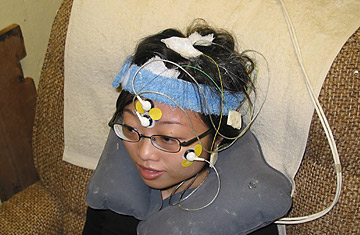
A participant in the P300 study practices for the deception detection test.
What if we could read the mind of a terrorist? Researchers at Northwestern University in Chicago say they have taken a step closer to that reality with a test that could uncover nefarious plans by measuring brain waves.
In a study published in the journal Psychophysiology, psychologists John Meixner and Peter Rosenfeld used electrodes to measure the brain waves of 29 undergraduates who had been told to mock-plan either a terrorist bombing in Houston in July, or a vacation in a different city in a different month. The researchers then presented the students with the names of various cities, methods of terrorist attack and dates. As they did so, they scanned the subjects' brains with electroencephalography (EEG), which records electrical activity along the scalp produced by the firing of neurons. They watched for a particular brainwave — dubbed the P300, because it fires every 300 milliseconds — which signals recognition of something familiar.
"The P300's amplitude is very large when you see an object that is rare and personally meaningful to you," Meixner says. "So the amplitude of P300 was large when we presented the word 'Houston,' the city where the attack was planned. In total we were able to identify 10 out of 12 'terrorists.'" The investigators also correctly matched 20 out of 30 crime-related details, such as types of explosives and specific sites and dates.
The P300's potential as a method for confirming concealed information was first recognized in the 1980s. But while it has long been touted as a possible substitute for the polygraph lie detector test, it has yet to be used by law enforcement anywhere in the world — although Japan is experimenting with it. One of the reasons is that it becomes difficult to use if investigators do not know the information they are trying to confirm. For instance, in Meixner and Rosenfeld's study, the researchers would have struggled had they not known that the city in which the attack was planned was Houston, since it would be only by luck or guesswork they would have included it in the sample list of names.
"The test has limited application," Rosenfeld admits. "In the case of anti-terrorism, you'd need to have some chatter and intel to know what you are looking for."
What's more, the P300 is vulnerable to what scientists call "confounding factors." For instance, if the mock-terrorists in the study were raised in Houston, which was also the location of the attack, the researchers would not know for sure what was causing the P300 spike. This makes the test particularly unreliable once details of a crime or plot have been released to the public. Anyone who then read about a planned attack in Houston would have a spike at the name. The same false positive would be triggered if, say, a picture of a murder weapon had been released to the press and then was shown to a suspect.
But Meixner and Rosenfeld say that despite these shortfalls, the technology holds more potential than the polygraph, which is admissible in the courts of roughly half of American states but which is rarely used due its unreliability. The polygraph measures such parasympathetic responses as respiration and sweating, which can certainly be triggered by a lie, but can also result from any high-stress situation — including the mere experience of being interrogated by a police officer.
While there is nothing that can correct for this problem with polygraphs, P300s can at least be made more accurate by increasing the number of details you show a suspect. Even people who follow the news very closely would not be likely to know every single detail of a crime, such as weapon, date, exact address of the crime and the victim's clothing. But such details would be burned in the mind of the perp.
How far out is P300 as a viable law enforcement tool? Maybe not too far, judging by the company the researchers behind the new study have been keeping. Rosenfeld says the work was funded by the Defense Academy for Credibility Assessment — part of the Department of Defense — which trains federal polygraph operators. Certainly, even such friends in high places will not do much to win the P300 technique many friends among civil libertarians, who do not relish the specter of Big Brother peering into a private citizen's mind. Rosenfeld counters that in some cases, the civil liberties of suspects will in fact benefit, since a painless but comparatively reliable way of getting at the truth makes it harder to justify harsh interrogation techniques.
For his part, Rosenfeld would like to get past all these theoretical arguments and simply have the opportunity to put his technique to the test. "I say give me a chance to prove it," he laments. "I would really like to use this on some real perps."
